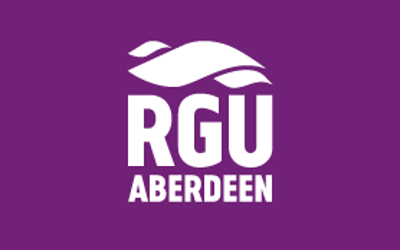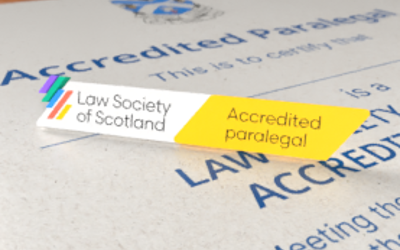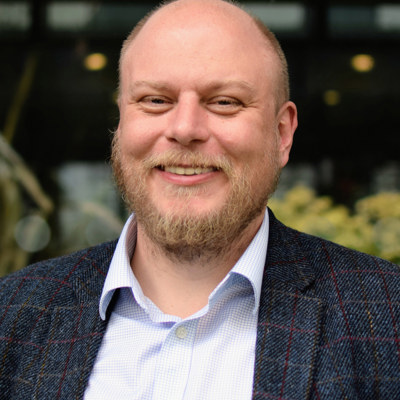Building a course for paralegals: The challenges of online learning and a work life balance
Following on from Jim McKay's discussion on the early stages of setting up the Paralegal Practice Course with Robert Gordon University (RGU), we sit down with David Christie, the Associate Dean for Academic Development and Student Experience at RGU’s Law School, to understand why they wanted to create the course and the challenges of online learning.
Having been a practising solicitor before joining Robert Gordon University (RGU) 12 years ago, I’ve always been aware of the benefits of a practical focus to legal academia. In particular, I’ve always been keen to find ways to use the platform we have at RGU to reach into both the different parts of the legal (and law adjacent) professions and the groups of students to help them to develop themselves and their careers.
So, when I heard that the Law Society of Scotland were looking to partner with a University provider, it was too good a chance to miss.
RGU has been at the forefront of the development of work-based learning in Scotland, particularly through leading the development of graduate apprenticeship programmes in a host of areas.
Moreover, the Law School leads the way in delivering online legal education at a University level in Scotland, both with its online LLB and Diploma in Legal Practice programmes (the first and only Law Society accredited routes to qualification in Scotland) and with its international masters programmes which have students across dozens of countries.
These linked areas of strength gives the Law School the platform to deliver on its part of the RGU mission of transforming people and communities. They enable us to reach current and potential students and provide opportunities for people to access legal education who would not have otherwise been able to.
One of the key things I’ve learned in delivering online, however, is that online learning can’t always be the same thing as “remote” learning. It needs to be designed and delivered in a way which helps students to engage with the materials and to stay engaged. All students nowadays have a range of things to juggle but there is a magic to coming on campus which helps students to get into “learning mode”. Online students can find it more difficult to make the switch from one thing to another because so much of lives are online, there is not another place to go.
The paralegal course was looking at two groups of potential students, those at the outset of their careers and those with experience but lacking formal qualifications. Both groups would be busy and without necessarily deep experience of a post-school learning environment.
The most important lesson I learned from practice was that most professional problems whether operational or strategic could be solved by “getting close to clients” – finding out how to deliver what they need, not just what they want.
The real opportunity with the paralegal programme, therefore, was not just that the Law Society partnership would give a programme immediate credibility. It was that it would understand the constraints and challenges which would face students and through our partnership the paralegal committee members could discuss together to resolve them.
As a result, we have a programme which tries to balance the flexibility to allow online learners to manage their own learning but within a structure which needs them to take responsibility for what they do. There are opportunities to meet and interact at the same time – but also to interact asynchronously. Crucially, we know that we need to be in regular touch with the students to make sure that there are bonds with them through the screens and that we can help. Trust is a key component to the learning journey; both between students and tutors but crucially also between students themselves, and that can take longer to build up online.
One of the key decisions has been to make the qualification achievable part time and in a relatively short time, with a Certificate in Higher Education being the outcome. This provides a first step on the journey for some students to other qualifications – or provides others with the formal recognition of years of skills and knowledge acquisition.
It’s been great to have the Law Society of Scotland helping us in getting the word out about this course: new courses are always a challenge to explain and deliver and it’s been fun doing so. It was a particular pleasure to read applications which seemed to be coming from just the sort of people who we were hoping to appeal to.
It’s also been fantastic to have Rachel O’Neill on board to lead the teaching of the course. Not only does she have recent experience in paralegal, but I’ve been astounded by the way she’s taken the detailed but high level course documentation which was worked up to get the course up and running and turned it into a living and breathing educational experience.
I’m looking forward to getting the word out further in the coming weeks and months, with an aim of building a community of paralegal learners across Scotland. I’m also going to be working on ideas for the next steps for those who – in due course – complete the certificate and are looking to take the next steps in their personal and career development.
Applications for the Paralegal Practice course are now open. Join 2025’s cohort by submitting your application here.

Paralegal Practice Cert HE
Find out more about our Paralegal Practice Course with Robert Gordon University.

Accredited Paralegals
Our Accredited Paralegal status is a voluntary accreditation for paralegals working in Scotland.


